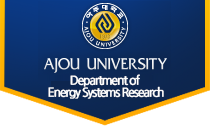① Composition of the Curriculum:
- · The Master's/Ph.D. degree curriculum consists of Convergence Basic, Convergence Elective, and Advanced Major.
- · Convergence Basic is composed of courses that enable students to understand the overview of energy science and technology as a whole. They are divided into common and elective requirements. All graduate students must take common requirements, and Introduction to Energy Systems is offered every semester. Students are required to take electives, including Energy Economics, Energy Conversion Engineering, Energy Storage Technology, Energy Materials and Devices, and Energy Engineering; they must take at least one of these courses.
- · Advanced Major is composed of approximately 40 specialized courses, including Energy Engineering, Energy Materials Chemistry, New & Renewable Energy Engineering, Theories on Energy Policy, etc., depending on specific research fields and detailed majors. Students will have modular and in-depth education programs after selecting research fields in consideration of their aptitudes and hopes, the professional supply and demand status in the industry, research institutes, academies, departmental policies, and academic advisers/supervisors. The curriculum covers specialized convergence tracks for convergence research.
- · Field training and industry-academia-institute cooperative courses are offered to provide programs considering the current research and industry trends and strengthen cooperation with industries and research institutes continuously. Through this process, students can realize the research gap in the graduate school’s laboratory and the field, broadening their employment opportunities, and gaining the effect of quickly adapting to the new environment when conducting fieldwork after employment. Experts in various fields are invited as adjunct or special professors to provide students with customized programs meeting the needs of industries, research institutes, and other institutions.
<Curriculum of Carbon-Zero Renewable Energy Systems Research>
- · Convergence Basic (common requirements)
- · Convergence Basic (elective requirements)
- *Changed the core elective courses title from “Energy Conversion Engineering” to “Energy Engineering” from the second semester of 2016 (refer to the revised Bylaws for more details)
- · Convergence Elective (elective)
- · Advanced Major (elective)
- · Industry-Academy-Institute Collaboration courses
- · AICBM subjects
- · Internationalization and academic activity support programs
- · Research ethics and laboratory safety training
② Integrated Education Tailored for Each Track:
This department has faculty members with various major backgrounds such as Natural Science, Engineering, Social Science, etc. Through program tracks specialized in research fields and the curriculum for each major, it aims to foster professionals with connected intelligence skills who can comprehend the whole energy system with expertise in specific research fields. The established track is as follows, and students must take certain elective courses along with Introduction to Energy Systems, a common core course. Track requirements consist of common and elective requirements, completing a total of 18 credits.
※ Common Certification Requirement (9 credits)
- ▷ Energy Conversion System Track
- ▷ Energy Storage & Distribution Track
- ▷ Energy Materials and Devices Track
- ▷ Energy System Integrated Assessment Track
③ Course Evaluation Plans and Outcomes
- · To improve the quality of courses, the project group conducts mid-semester surveys and end-of-semester course evaluations. The mid-term survey is a system to effectively achieve feedback on the adjustment of course levels and teaching methods by identifying students’ needs during the semester. The end-of-semester course evaluations are mandatory, and students can find their grades during the grade posting period only when they complete course evaluations on the website.
- · The course evaluation questionnaire consists of descriptive opinion and 19 optional items, including three questions about course attitudes, three questions about course preparation, five questions about course progress and contents, four questions about learning evaluation, and two questions about educational outcomes. For each elective item, there are ranges from the lowest point, one (converted to 20 points) to the highest point, five (converted to 100 points). According to the aggregate course evaluation data on 92 courses under the project over the past three years, the overall converted score for course evaluations was approximately 90 points, indicating that the overall students’ satisfaction was very high.
- · The course evaluation outcomes influence faculty achievement evaluation and are the main factors determining their salaries and promotion. Since 2007, the course evaluation outcomes of all participating professors have been disclosed on the project group's website, allowing anyone to get access to the data.
- ④ Enhancement of Thesis Writing Methods and Research Ethics Education
- · To improve the international competitiveness of graduate students, this project group provides international and academic activity support programs, including thesis writing in English and special lectures with international scholars. Students can graduate when they reach a certain English proficiency level, by passing official English tests such as TOEFL, TOEIC, or TEPS. It is mandatory to write and present a doctoral thesis in English, and it is strongly recommended that a master’s thesis should be written in English as well.
- · There is an increasing need for continuous education on research ethics, including research integrity. All graduate students are obligated to take courses in research ethics education at least two times before graduation, covering awareness of and responses to research misconduct, such as researcher’s social responsibility and plagiarism. In addition, there will be courses for writing and managing research notes; research notes are important for systematic research activities and sharing of research results and also become crucial evidence for such problems as plagiarism of research results and patent infringement.






































